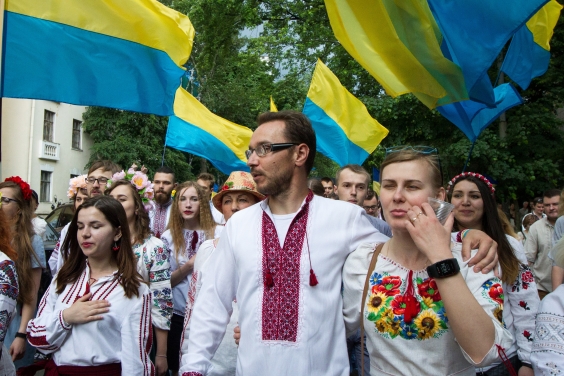Article for «U.S. News & World Report»
As West Germany rebuilt itself in the wake of World War II's mass devastation, framers of the new order paid careful attention to the lessons learned from the Weimar Republic to the defeat of Adolf Hitler's regime. The results were a careful balance of powers in the new constitution, and the so-called Basic Law, which essentially ensured that the regions of Germany had as much say in the country's governance as the capital, first in Bonn and now in Berlin. Eventual reunification depended on first getting the pieces in order – or at least one of them. The rest came later.
While the situations are not entirely analogous, Ukraine today is a divided country as a conflict continues in the East. The costs of this fighting have been steep, with tens of thousand killed, millions displaced and billions in lost property and industrial capacity – not to mention territory. But it has not been a total war in the respect that the political elite in Kiev has adapted to the realities of this conflict. It is not a secret that Ukraine has certain political forces which benefit from war. Some politicians from the ruling coalition are openly calling for cutting off Donbas and completely disenfranchising our citizens who live there.
Recently, new laws passed by the ruling coalition introduced quotas for use of the Russian language on TV, blocked Russian social media networks in Ukraine and, in so doing, disenfranchised a significant percentage of Ukrainian citizens from enjoying the same basic rights of communication and expression enjoyed by people around the world – including in many authoritarian regimes. An Orwellian Ministry of Information regularly threatens media that does not conform with the state's official narratives, and opposition television stations have been attacked by allegedly unofficial militias that enjoy close relations with the parties that make up today's governing coalition. One of these television channels, Inter, was fire-bombed and raided last September, and while this occurred in broad daylight, there have been no convictions. After all, the purpose of intimidating the media is to instill fear in the opposition.
All of these obstacles to a free and prosperous country are sustained in one form or another by the specter of war. So while fighting in the East consists today of skirmishes rather than offensives, it may be premature to begin building a lasting and durable peace. But it is not too early to begin laying the framework for the kind of peace that the citizens of Ukraine, if not the "coalition of war," demand.
Germany's post-war experience is applicable to this framework, and to key elements which made up the 2015 Minsk II agreement between Moscow and Kiev. These include devolving more authority from Kiev to the regions and constitutional amendments that would create a stronger balance of powers in the country by transferring the major bulk of power to local and regional governments. The current Kiev government does not want to pass these changes, officially because they demand the withdrawal of heavy weapons from Donbas first, but in actuality because such changes would undermine the corporatist regime they built and strengthened in the name of war.
The constitutional and broad legislative changes that we need to achieve these outcomes can only happen as a result of a process of national reconciliation and dialogue, and the reintegration of Donbas. Those who desire an end to war and a truly unified country – and it is almost 80 percent of Ukrainians – support this, and those who do not have fallen into the trap of what one wise man called man's greatest stupidity: forgetting what he was trying to do in the first place.
While the cold stalemate in Ukraine's three-year conflict may seem to have adopted an unhealthy sense of normalcy, the time for movement towards peace may be at hand. Recently, a senior Russian official recognized for the first time the need for direct talks between Moscow and Washington on the Ukrainian question. And America's new president, under fire by opposition in his own country for allegations of being too close to Russia, may have a surprise or two in store when it comes to being a potential peacemaker. As U.S. Secretary of State Rex Tillerson suggested in recent testimony, it may well be time to start thinking outside the Minsk box when it comes to solutions for Ukraine.
